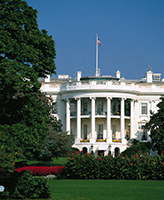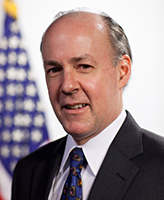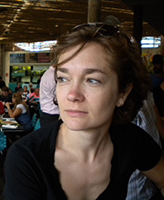
It’s no secret that Notre Dame alumni go extraordinary places with their degrees. A select few have even made it to the highest echelons of the United States government—working within the White House to support the president himself.
Graduates of Notre Dame’s College of Arts and Letters work in the Situation Room, with the Department of Justice, on national security, and as the deputy chief of staff to President Barack Obama.
“The Department of Political Science has a track record of setting up graduates like former Secretary of State Condoleezza Rice and former Ambassador and Congressman Tim Roemer for careers of service in the very highest levels of our government,” says Professor and Department Chair Michael Desch.
Within the White House, Rob Nabors, ’93, currently serves as the president’s deputy chief of staff. Nabors studied government and international relations, as did Katie Bierne, ’98, who works as deputy director of communications. Ted Choido, ’02, a history major, is chief of staff for the Office of the Staff Secretary in the Executive Office of the President.
Privilege in Service

“It’s a tremendous privilege to work in the White House for one day,” says Brian McKeon, ’85, “much less four and a half years.” McKeon wears multiple hats as the deputy assistant to the president, executive secretary, and chief of staff to the National Security Staff.
While at Notre Dame, McKeon studied government and international relations. Shortly after graduation he began working for then-Senator Joseph Biden on Capitol Hill. He eventually rose to a position on the Foreign Relations Committee. In 2009, McKeon followed Vice President Biden to the White House, and he accepted his current position there in 2012.
Working at such a high level of government involves intense coordination. “Our job here is two functions,” says McKeon. “One is to literally staff the president and make sure he’s appropriately briefed for his meetings and has the information he needs to make decisions as commander-in-chief.
“The other function of the National Security Staff is to coordinate the rest of the government and make sure everyone has the chance to have their say and make recommendations and that they then execute the decisions and follow the president’s orders,” he says.
The intensity of the job demands 13-hour days from McKeon, but it’s a sacrifice he makes willingly. “It’s an exciting thing to walk into the White House every day to work—especially for a president that you believe has the best interests of the country at heart.”
Intense Coordination

A recent transfer from the Department of Justice, Megan Stifel, ’97, works in the Cyber Directorate within the White House. She focuses on international and cyber security while supporting the National Security Council on temporary detail from the Department of Justice.
“I’m essentially helping to coordinate the U.S. government’s approach to challenges with Internet governance,” she says. “A lot of what we do is engage bilaterally with different governments coming to Washington for consultations.
“It’s a very fast-paced environment where you leave your house on Monday morning and think you know what you’ll be doing all day. But maybe you’ll get only one of those tasks done because things are really unpredictable. You have to be able to go with the flow and adjust.”
There’s a clear payoff, though. “It’s great to have an opportunity to see democracy in action and it’s very rewarding to feel like I’m contributing to administration goals,” she says.
Throughout her career, Stifel has continued to draw on her undergraduate experience as a government and international relations major in the College of Arts and Letters—from the communications and analysis skills she uses daily to the dedication she brings to her work.
“There were several professors whose passion for what they were teaching gave passion to their students,” she says. “It really instilled in me the sense that you can love what you do.”
Notre Dame Tradition
McKeon says Notre Dame’s emphasis on service made an impression on him as well. “My family and my educators instilled in me very important values about public service and helping other people—that’s what working in the government is all about,” he says. “That part of my Notre Dame education has been one of the most important assets to my career.”
Notre Dame’s powerful alumni network is also a vital asset. Alumni working inside the Beltway regularly assist current students through internships and a mentoring program coordinated by the University’s Career Center. And the network continues to yield benefits after graduation. “Reaching out to Notre Dame alumni, that’s how my first job came about,” Stifel recalls.
Desch says he is not surprised that the education students receive here as undergraduates can have such a lifelong impact. “Notre Dame’s Department of Political Science not only provides an exciting and challenging intellectual experience, but our alums are in the White House and on Wall Street and in jobs that others can only dream about.”
Whether working as deputy chief of staff to the president, in the Department of Justice, in national security, for the press, or even in the Situation Room, Notre Dame alumni have made their mark in Washington and in the White House, and they show no signs of slowing.
“I find my work very rewarding,” says Stifel. “I wish I had more hours in the day.”
Learn More >
- Department of Political Science
- Political Science undergraduate program
- Brian McKeon Announced New Executive Secretary/Chief of Staff for the National Security Staff
- Alumna Appointed White House Deputy Director of Communications
- Washington, D.C. Program
- Related story: Mentoring Program Links Notre Dame Political Interns with Alumni


